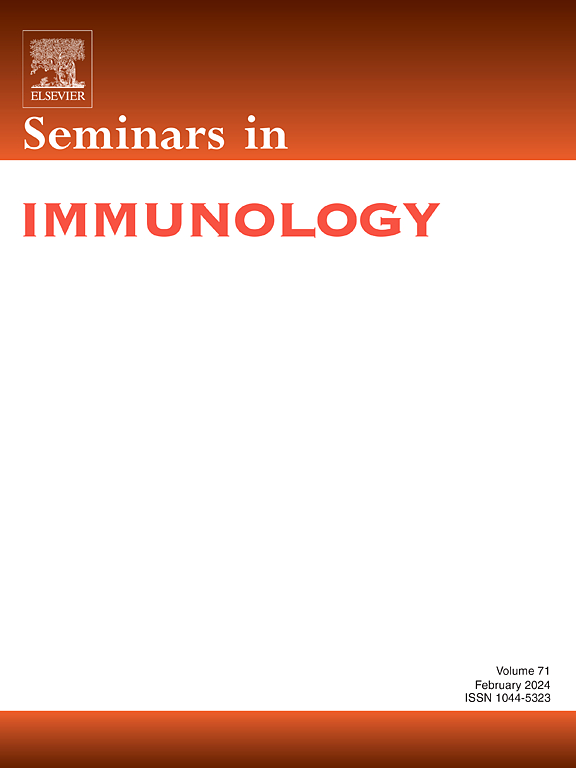The glycoimmune landscape in health and disease
IF 7.4
2区 医学
Q1 IMMUNOLOGY
引用次数: 0
Abstract
Emerging observations at the molecular, cellular, and organismal levels have unveiled critical roles for glycans in regulating a broad range of innate and adaptive immune cell processes. Through interactions with various families of glycan-binding proteins, including galectins, C-type lectins, and siglecs, glycans shape the nature, the fate and the function of immune cell types, modulating processes such as immune cell development, activation, differentiation, trafficking, exhaustion, and survival. Furthermore, dysregulated glycosylation pathways and altered glycan-binding receptor functions are associated with several pathological conditions, including infection, autoimmunity, and cancer. This special issue highlights the most recent updates and current challenges on the multifunctional roles of glycans and glycan-binding proteins in orchestrating, amplifying, or inhibiting immune responses. This collection seeks to enhance awareness of the significance of glycans in immunobiology and immunopathology from cellular, molecular, and evolutionary perspectives into clinical applications, underscoring their relevance as promising biomarkers and targets for designing novel immunotherapeutic approaches.
健康和疾病中的糖免疫景观
在分子、细胞和有机体水平上的新观察揭示了聚糖在调节广泛的先天和适应性免疫细胞过程中的关键作用。通过与各种聚糖结合蛋白家族(包括凝集素、c型凝集素和siglecs)的相互作用,聚糖塑造了免疫细胞类型的性质、命运和功能,调节了免疫细胞的发育、激活、分化、运输、衰竭和生存等过程。此外,糖基化途径失调和聚糖结合受体功能改变与多种病理状况有关,包括感染、自身免疫和癌症。本期特刊重点介绍了聚糖和聚糖结合蛋白在协调、放大或抑制免疫反应中的多功能作用的最新进展和当前的挑战。本收集旨在从细胞、分子和进化的角度提高对聚糖在免疫生物学和免疫病理学中的重要性的认识,并将其应用于临床应用,强调它们作为有前途的生物标志物和设计新型免疫治疗方法的靶点的相关性。
本文章由计算机程序翻译,如有差异,请以英文原文为准。
求助全文
约1分钟内获得全文
求助全文
来源期刊

Seminars in Immunology
医学-免疫学
CiteScore
11.40
自引率
1.30%
发文量
50
审稿时长
89 days
期刊介绍:
Seminars in Immunology is a specialized review journal that serves as a valuable resource for scientists in the field of immunology. The journal's approach is thematic, with each issue dedicated to a specific topic of significant interest to immunologists. It covers a wide range of research areas, from the molecular and cellular foundations of the immune response to the potential for its manipulation, highlighting recent advancements in these areas.
Each thematic issue is curated by a guest editor, who is recognized as an expert in the field internationally. The content of each issue typically includes six to eight authoritative invited reviews, which delve into various aspects of the chosen topic. The goal of these reviews is to provide a comprehensive, coherent, and engaging overview of the subject matter, ensuring that the information is presented in a timely manner to maintain its relevance.
The journal's commitment to quality and timeliness is further supported by its inclusion in the Scopus database, which is a leading abstract and citation database of peer-reviewed literature. Being indexed in Scopus helps to ensure that the journal's content is accessible to a broad audience of researchers and professionals in immunology and related fields.
 求助内容:
求助内容: 应助结果提醒方式:
应助结果提醒方式:


